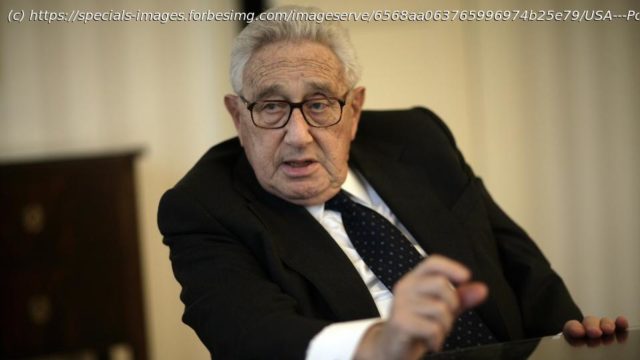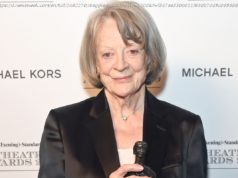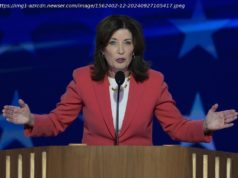Singers Sinead O’Connor and Tony Bennett and actors Lance Reddick and Raquel Welch are among the celebrities who have died in 2023.
Topline
From daytime television star Billy Miller to musicians Steve Harwell and Sinead O’Connor, the following celebrities are among the biggest stars who have died this year.Key Facts
Listed below, by date, are celebrities who have died in 2023, leaving behind storied legacies in the film, television and music industries.
Shane Macgowan (november 30)
Legendary Irish singer-songwriter Shane MacGowan died at age 65, his wife Victoria Mary Clarke announced in an Instagram post. MacGowan was best known as the lead singer of The Pogues, a Celtic punk band founded in London in 1982. The Pogues achieved mainstream success with their unique blend of punk rock and traditional Irish folk songs and instruments. One of their most enduring hits is 1987’s “Fairytale of New York,” a Christmas song MacGowan co-wrote and sang as a duet with Kirsty MacColl. MacGowan’s cause of death has not been announced, but he had been in poor health for years after a long battle with drug and alcohol addiction. He was diagnosed with viral encephalitis, a potentially deadly brain inflammation, in December 2022. Tributes for the legendary punk lyricist came from across Irish and British society, showcasing the artist’s wide reach and appeal. Irish President Michael Higgins called MacGowan “one of music’s greatest lyricists,” and praised his contributions to Irish music and culture at large. “His words have connected Irish people all over the globe to their culture and history, encompassing so many human emotions in the most poetic of ways,” the president said. Irish Prime Minister Leo Varadkar also praised the singer in a post on X, formerly Twitter: “His songs beautifully captured the Irish experience, especially the experience of being Irish abroad.”Henry Kissinger (november 29)
Henry Kissinger, the divisive former secretary of state who served under Presidents Richard Nixon and Gerald Ford, died Nov. 29 at age 100. Kissinger wielded major influence over American foreign policy for decades and is credited with helping negotiate the end of the Vietnam War. For his efforts in Vietnam, Kissinger was awarded the 1973 Nobel Peace Prize alongside North Vietnamese diplomat Le Duc Tho. The decision to award the prize was met with controversy: Tho declined to share the prize, stating “peace has not yet really been established in South Vietnam,” and two members of the Nobel Prize Committee resigned in protest. Kissinger’s handling of Vietnam was met with plenty of critics, who accused him and Nixon of needlessly prolonging the bloody war that killed more than 58,000 Americans. His authorization of bombings of Cambodia in 1969 and 1970, which he hoped would eliminate pro-Communist forces, led critics to brand him as a “war criminal” and argue his actions helped Cambodia fall into the hands of the Khmer Rouge regime, which killed more than 1.7 million Cambodians, then a quarter of the country’s population. Kissinger was also known for opening up U.S. relations with China, paving the way for Nixon’s historic visit to the country—Kissinger himself has reportedly visited China more than 100 times, including after his tenure. Kissinger also employed a “détente” approach to Soviet relations, easing tensions during the Cold War, and engaged in “shuttle diplomacy” to improve relations between Israel and Arab nations. His approach to foreign policy was considered “realpolitik”—an approach based on pragmatism rather than moral values—which was a divisive strategy that critics considered immoral. Kissinger’s death was met with tributes from world leaders. China mourned Kissinger’s death, with state media calling him “China’s old friend” and China’s Foreign Ministry calling him “a pioneer and architect of China-US relations.” Israeli Prime Minister Benjamin Netanyahu said Kissinger’s understanding of international relations was “unparalleled.” German chancellor Olaf Scholz called him a “great diplomat,” and Russian President Vladimir Putin considered Kissinger a “wise and talented statesman.” But Chile’s Ambassador to the United States, Juan Gabriel Valdes, posted on X that Kissinger’s brilliance “never managed to conceal his profound moral misery.” Documents have shown Kissinger supported a coup in Chile that ushered in a right-wing dictatorship. American politicians—many Republicans—paid tribute to Kissinger, including former President George W. Bush, Sen. Mitt Romney (R-Utah) and House Speaker Mike Johnson (R-La.). Senate Minority Leader Mitch McConnell (R-Ky.) called him „a titan among America’s most consequential statesmen.”Rosalynn Carter (november 19)
Rosalynn Carter, the former first lady and wife of former President Jimmy Carter, died Sunday at age 96, days after entering hospice care. Carter was known as a politically active first lady who frequently advised her husband and advocated for causes including mental health reform. She served as the first lady of Georgia from 1971 to 1975 when her husband served as governor, and first lady of the United States from 1977 to 1981. As first lady, Carter sat in on cabinet meetings, lobbied on behalf of the Mental Health Systems Act of 1980 and served as an honorary member of the President’s Commission on Mental Health. She is credited by historians as redefining and formalizing the role of the first lady, becoming the first to formally claim office space for herself and her staff, which succeeding first ladies have done. She took a two-week diplomatic trip to several Latin American countries in 1977, which the New York Times considered a “personal and diplomatic success that goes far beyond the modest expectations of both her foreign policy tutors at the State Department and her hosts.” Her active role as first lady led TIME Magazine to call her the “second most powerful person in the United States” in 1979. After the Carter presidency, Jimmy and Rosalynn maintained an active lifestyle, founding the Carter Center, a human rights nonprofit, and working with Habitat for Humanity to build homes. In their later years, the Carters have both dealt with health issues. Carter’s family announced in May the former first lady was living with dementia. Jimmy Carter, who at age 99 is the longest living former president, entered hospice care in February, several years after beating brain cancer and enduring other health scares. In a statement following his wife’s death, the former president said: “Rosalynn was my equal partner in everything I ever accomplished. She gave me wise guidance and encouragement when I needed it. As long as Rosalynn was in the world, I always knew somebody loved and supported me.” Jimmy Carter had previously stated living into his 90s was difficult, but the secret to keep going was to “marry the best spouse.”Bob Knight (november 1)
Bob Knight, the iconic basketball coach whose decades-long career made him one of the most successful NCAA coaches of all time, died November 1 at age 83, his family announced in a statement posted to his website Wednesday night. Knight, nicknamed “The General,” was known for both his successful coaching style and his temper, which earned him many devoted fans and critics. He became the youngest coach at a Division I school in 1965 when he began coaching the Army Black Knights, where he remained until 1971, when he famously began coaching the Indiana Hoosiers for three decades. While at Indiana, he coached the team to win a record 661 games and three NCAA titles. In 1976, he won his first NCAA title after Indiana went undefeated the entire season, a feat no team has accomplished since. Knight also coached the United States men’s basketball team at the 1984 Olympics, leading them to a gold medal victory. Knight remained at Indiana until he was fired in 2000, after a student alleged Knight grabbed him by the arm and cursed at him after the student called him by his last name. Indiana had adopted a zero-tolerance policy for Knight after a pattern of behavioral issues, including an allegation made by a student, which was captured on video, that Knight had choked him during a practice. Though Knight said he didn’t choke the player, the university suspended him for three games and fined him $30,000. Knight also threw a chair across the court during a 1985 game against Purdue and was charged with striking a police officer before a practice session in Puerto Rico in 1979. After his termination from Indiana, Knight coached the Texas Tech Raiders until his retirement in 2008. He finished his career with a then-record 902 NCAA Division I game victories and was inducted into the Basketball Hall of Fame in 1991. The current record-holder for Division I game wins is Mike Krzyzewski, a former player Knight coached at Army. “We lost one of the greatest coaches in the history of basketball today,” Krzyzewski said in a statement. “This is a tremendous loss for our sport and our family is deeply saddened.” Knight’s family did not specify a cause of death, though Knight was hospitalized with an unspecified illness for several days in April.Matthew Perry (october 28)
Best known for his performance as Chandler Bing on the NBC sitcom Friends, actor Matthew Perry died at his Los Angeles residence on October 28. He was found unresponsive in his hot tub. Perry’s role in Friends, one of the most-watched shows of all time, from 1994 to 2004, garnered a nomination for the Primetime Emmy Award for Outstanding Lead Actor in a Comedy Series and in 2021, he was nominated again for his role as executive producer in Friends: The Reunion. The final episode of Friends was the most watched television episode of the 2000s. Perry and his Friends co-stars, Jennifer Aniston, Lisa Kudrow, Courteney Cox, David Schwimmer and Matt LeBlanc, reunited in 2021 for Friends: The Reunion, an HBO Max special that marked his final onscreen appearance. Perry also appeared in shows including Ally McBeal, The Good Wife and The West Wing, earning two Emmy nominations for the latter. Perry was also known for being outspoken about addiction, which he struggled with while starring on Friends. He discussed his addiction and recovery in his memoir, Friends, Lovers, and the Big Terrible Thing, released in 2022. He reportedly started drinking at 14 and has said he spent at least $7 million on efforts to get sober. Perry has said his “paramount thing is that he wants to help people,” stating: “The best thing about me, bar none, is that if somebody comes to me and says, ‘I can’t stop drinking, can you help me?’ I can say ‘yes’ and follow up and do it.” Tributes to Perry flooded social media following his death. Former classmate and Canadian Prime Minister Justin Trudeau said Perry’s death was “shocking and saddening,” stating: “I’ll never forget the schoolyard games we used to play, and I know people around the world are never going to forget the joy he brought them.” Other celebrities and former co-stars including Selma Blair and Gwyneth Paltrow paid tribute to Perry on Instagram. Friends co-creators Marta Kauffman and David Crane and executive producer Kevin Bright said in a joint statement they are “shocked and deeply, deeply saddened” by Perry’s death, stating they will “always cherish the joy, the light, the blinding intelligence he brought to every moment.” The Los Angeles County Medical Examiner is investigating Perry’s cause of death, which it currently lists as “deferred.”Richard Roundtree (october 24)
Actor Richard Roundtree died Tuesday at age 81 following a battle with pancreatic cancer. Roundtree was best known for his portrayal of private eye John Shaft in the 1971 film Shaft, leading him to be known as the first Black action hero. Shaft was a hit upon release, grossing $12 million on a $500,000 budget, and it was selected in 2000 for preservation in the United States National Film Registry for being „culturally, historically, or aesthetically significant.“ Thanks to the success of Shaft, which was his first-ever film credit, Roundtree was nominated for the Golden Globe Award for New Star of the Year in 1972. Roundtree starred in two Shaft sequels—Shaft’s Big Score! (1972) and Shaft in Africa (1973)—though neither matched the success of the original. He also led a series of Shaft television films on CBS between 1973 and 1974. Roundtree’s later roles included the television miniseries Roots (1977), a role opposite Clint Eastwood and Burt Reynolds in City Heat (1984) and an appearance in David Fincher’s Seven (1995). On television, Roundtree appeared in episodes of Beverly Hills, 90210, Desperate Housewives and The Fresh Prince of Bel-Air. Roundtree would later reprise his iconic role as John Shaft in two spinoff films, both starring Samuel L. Jackson: Shaft (2000) and Shaft (2019). In a tribute on Instagram following his death, Jackson called Roundtree “the prototype” and “the best to ever do it.” Roundtree’s manager Patrick McMinn, who confirmed his death to Variety, said: “Richard’s work and career served as a turning point for African American leading men in film. The impact he had on the industry cannot be overstated.”Suzanne Somers (october 15)
Actress and fitness guru Suzanne Somers died on the eve of her 77th birthday after battling an aggressive form of breast cancer for more than 23 years, her publicist told the New York Times on Sunday. She first broke into Hollywood by uttering just three words (”I love you”) in George Lucas’ 1973 comedy American Graffiti and was best-known for her role as one of two female leads in Three’s Company. Her character, Chrissy Snow, was an effervescent blonde known for her unfortunate double-entendres while living with roommates played by Joyce DeWitt and John Ritter. She stared in eight seasons of the sitcom Step By Step in the 1990s before making a career switch to the world of personal fitness with the ThighMaster. She and her husband, Alan Hamel, made $300 million from her ThighMaster business, which included two dozen books. She hosted a short-lived talk show on Lifetime called The Suzanne Show in 2012 and appeared on Dancing with the Stars in 2015.Phyllis Coates (october 11)
Known for her portrayal of Lois Lane on television’s Adventures of Superman in 1952, making her the first actress to play the iconic character on TV, Coates died of natural causes Wednesday at age 96, her daughter Laura Press confirmed to The Hollywood Reporter. She only played the role for one season before being replaced by Noel Neill, reportedly because of conflicts with producers and other projects she had committed to (the show ran for six seasons before ending in 1958). Coates first assumed the role of Lois Lane in the 1951 film Superman and the Mole Men, the first feature film to star the titular hero, or any DC Comics character. Coates began her show business career as a chorus girl, touring with the United Service Organizations to perform for U.S. Armed Forces members, before landing small roles in films like Smart Girls Don’t Talk (1948) and My Foolish Heart (1949). Coates starred in an extensive number of film and television projects throughout the 1950s following her Superman success, including Jungle Drums of Africa (1952), Panther Girl of the Kongo (1954) and Girls in Prison (1956). Though she starred in few projects after the 1960s, Coates made her final appearance on screen in Hollywood: The Movie (1996), according to her IMDB page. Coates was portrayed by actress Lorry Ayers in the film Hollywoodland (2006), a fictionalized account of the mysterious circumstances of the death of actor George Reeves, who played Superman opposite Coates’ Lois Lane.Dianne Feinstein (september 28)
Feinstein died Thursday night at age 90 as the longest-serving woman in U.S. Senate history. She was elected as California’s first female senator in 1992 in a special election (alongside Barbara Boxer, who was elected the same night) and won reelection five times. Feinstein was known for her gun control advocacy and authored the 1994 assault weapons ban (which expired in 2004) and repeatedly pushed for stricter gun laws, stating in 2018 she was “a woman on a mission to ban assault weapons.” Feinstein has attributed her gun control efforts to the 1978 assassinations of San Francisco Mayor George Moscone and supervisor Harvey Milk; Feinstein, then the president of San Francisco’s Board of Supervisors, was the first to find Milk’s body and shortly after announced their deaths to the press. After Moscone’s death, Feinstein automatically became acting mayor of San Francisco, winning reelection twice and holding that office for a decade. As mayor, Feinstein passed a ban on handgun possession and dedicated funding to HIV/AIDS research. Feinstein faced numerous health complications over the past year, including a bout with shingles that kept her out of the Senate for more than two months, and ensuing encephalitis and vision and balance issues. Feinstein faced, and resisted, calls to resign, though she pledged earlier this year not to run for re-election in 2024. Her death prompted tributes from politicians on both sides. Senate Majority Leader Chuck Schumer held a moment of silence for Feinstein Friday and called her “one of the most amazing people who ever graced the Senate, who ever graced the country.” Gov. Gavin Newsom (D-Calif.) called Feinstein “a political giant whose tenacity was matched by her grace . . . a dear friend, a lifelong mentor, and a role model not only for me, but to my wife and daughters for what a powerful, effective leader looks like.” Senate Minority Leader Mitch McConnell (R-Ky.) said Feinstein gifted him a depiction of the Capitol in 1992, which he said he looked at Friday morning and “remembered our dear colleague as a truly remarkable individual.






